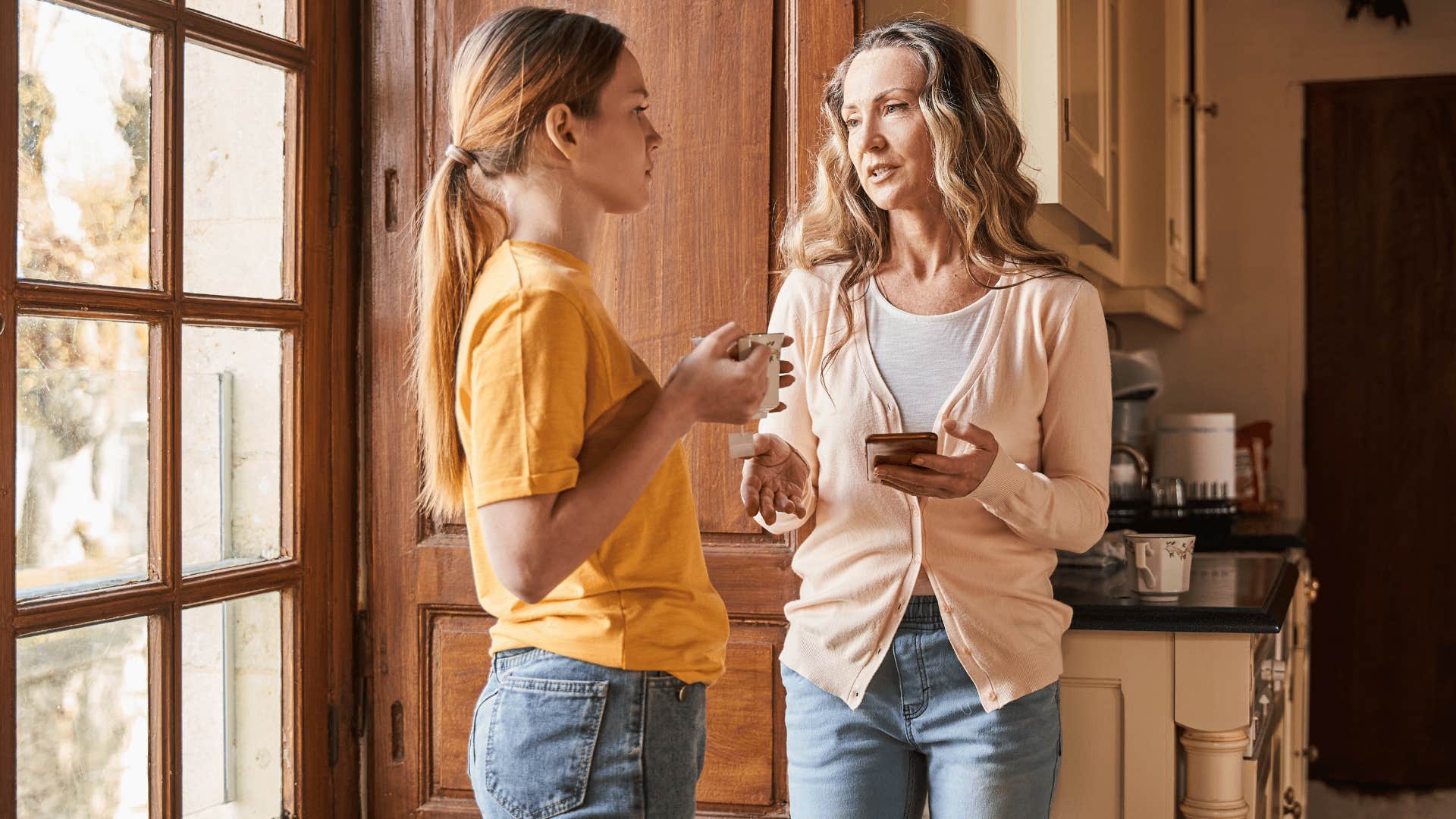10 Lessons On Good Manners Parents Don't Seem To Teach Their Kids Anymore
Kids who don't learn good manners aren't just rude, they suffer socially and professionally in the long run.
 Shutterstock / MIA Studio
Shutterstock / MIA Studio Nowadays, it seems like parents don't want to teach their kids good manners anymore. When you go to a restaurant, it's not uncommon to see a child on their iPad or disrespecting their parents. As they watch the child sneezing directly into their own hands, people can't help but wonder, "Did no one ever teach them to use a tissue?"
It seems like hearing a "please" or "thank you" from a child isn't as common as it once was. In truth, most kids will probably ignore you while scrolling on their phones.
Observing so much out-of-touch behavior, most people can't help but wonder where it all went wrong. Though that might be a hard question to answer, there some basic good manners parents need to teach their kids if they don't want to raise people they wouldn't even want to deal with themselves.
Below are 10 lessons on good manners parents don't seem to teach their kids anymore
1. Proper table manners
 GaudiLab | Shutterstock
GaudiLab | Shutterstock
There are unspoken rules when dining out in public. Actions like slouching, putting elbows on the table, or constantly checking your phone would've gotten most people scolded back in the day. Unfortunately, times have changed and the younger generations have lost awareness of this kind of etiquette.
This is unfortunate, as table manners are essential to everyday life. From meeting their future partner's parents to going out to a work dinners, proper manners are important if you want to make a good impression.
"Using manners at the table is all about taming impulsivity," explains Dr. Kerry McGee. "And because willpower and self-restraint are recognized predictors of success in life, they’re worth nurturing. Expecting children to control themselves at the dinner table is the right way to begin teaching these skills."
2. Addressing people properly
 SpeedKingz | Shutterstock
SpeedKingz | Shutterstock
Another lesson on good manners parents don't seem to teach their kids anymore is addressing people properly. Regardless of the culture you come from, there is always a respectful way to address people older than you.
For instance, in the South, it's common to say, "Yes, ma'am" and "No, sir." Though this might seem old-fashioned to some, addressing people by the properly does matter.
In the South, a child would be considered highly rude if they didn't begin their sentence by saying this. Not only that, but their lack of good manners would reflect poorly on their parents. Many would assume they weren't raised right and give their parents a side-eye.
Addressing people in this way is considered a sign of respect. It's a way of indicating the child is aware that the person they are speaking to is knowledgable, experienced, educated, and versed in life.
Though it might seem unnecessary, teaching your child how to show respect in this way now will come in handy for them throughout their entire life.
3. Asking for permission instead of taking things
 Inside Creative House | Shutterstock
Inside Creative House | Shutterstock
When someone takes their kids to the playground, it can be rude and frustrating when someone else's child takes a toy without asking. It's normal for very young children to take things they are interested in without asking, and relaxed parents might not see this as a big deal and assume that their child is just having fun, but that fun toy they're playing with cost someone else money and does not belong to them.
A lack of proper boundaries like this can quickly into a bad habit of stealing things. If a child was never disciplined for taking things from others without asking, how are they supposed to know it's wrong?
Thankfully, there are a few ways to stop this behavior in its tracks. The American Academy of Child & Adolescent Psychiatry explains that when a parent sees their child taking something that doesn't belong to them, they should "tell the child that stealing is wrong, help the youngster to pay for or return the stolen object, make sure that the child does not benefit from the theft in any way, avoid lecturing, predicting future bad behavior, or saying that they now consider the child to be a thief or a bad person, and make clear that this behavior is totally unacceptable within the family tradition and the community."
4. Being grateful for the little things in life
 Perfect Wave | Shuttetstock
Perfect Wave | Shuttetstock
In a world where convenience is a right, not a luxury, it's easy for kids to grow up being used to privilege. Parents of children who haven't been taught to appreciate what they have might find themselves on the recent end of rolling eyes or dismissive gestures. The expensive presents these parents spend a fortune on begin to lose any meaning as their kids feel entitled instead of grateful, growing accustomed to taking things for granted.
This kind of entitlement isn't only rude it deprives the children themselves of the many benefits of experiencing gratitude.
UCLA Health notes that multiples studies conducted over the past several decades have found that taking time to be consciously grateful reduces depression, lessens anxiety supports heart health, improves sleep, and reduces stress.
Teaching your child to say thank you doesn't only make them a nicer person to be around, it makes them happier and healthier in the long run.
5. Letting people finish their sentences instead of interrupting
 Olena Yakobchuk | Shutterstuck
Olena Yakobchuk | Shutterstuck
Another lesson on good manners parents don't seem to teach their kids anymore is letting people finish saying what they are saying.
Being interrupted is a major frustration for many of us. It's rude and inconsiderate to not allow people to finish their thoughts.
Understandably, truly little kids don't know any better. When talking about their favorite TV show, it's difficult for them to contain their excitement, so they will ramble on about their interests, often unintentionally cutting others off.
One study published in PLOS ONE found that being interruptions can cause people to feel impatient, less motivated, and bored.
So even if it seems tedious, reminding children to wait their turn before speaking will help ensures your child isn't unintentionally making people around them feel frustrated, unmotivated or bored.
6. Making direct eye contact during conversations
 Pressmaster | Shutterstock
Pressmaster | Shutterstock
One lesson on good manners parents don't seem to teach their kids anymore is making direct eye contact. This is something many children struggle with. They may find it especially intimidating to hold eye contact while speaking with an adult. However, teaching kids the good manners of eye contact is beneficial for many reasons.
Firstly, it's social etiquette to keep eye contact with others. Not only that, but most would assume your child isn't confident if they're unable to do so.
A study published in Frontiers in Psychology found that eye contact is great for encouraging pro-social behavior. The research found that eye contact also helps improve memory and gets the appraisal of others.
So teach your children this simple behavior. It might be intimidating for them at first, but as they grow into adults this type of confident behavior will benefit them greatly. From employers to professors people will be impressed by their ability to look confident in all circumstances as they go through life.
7. Holding open the door
 Katerina Dalemans | Shutterstock
Katerina Dalemans | Shutterstock
When it comes to good manners parents don't seem to teach their kids anymore, holding open the door for others takes the cake. When someone is struggling and behind them, it's inconsiderate to let the door slam in their face as you go about your day.
Children should know better than that. Unfortunately, parents don't seem to be doing a great job of teaching their kids this skill.
Researchers found that the reason we do this for one another is mutually beneficial. As reporter Rylee Fouts explains, "If you hold the door for person behind you, they don’t have to take the effort to open the door. If everyone held the door for the person behind them, then over time you would have the door held open for you about as often as you held the door for others, and overall everyone would spend less effort opening doors."
With practice and reminders, most children will begin to understand the importance of this kind behavior and do it daily.
8. Not swearing in public
 Prostock-studio | Shutterstock
Prostock-studio | Shutterstock
It never used to appropriate for anyone, let alone children, to swear in public. If parents caught their kids swearing it was safe to say that their children would not be having a good day. However, this old-fashioned behavior isn't as common anymore.
This isn't shocking news for many who've seen videos of kids cussing with their parents in the background, laughing and not reprimanding their kids for using that kind of language. This encourages the kids to keep going without a care in the world.
Unfortunately, this kind of behavior isn't as innocent as people would like to make it seem.
Researchers from Southern Connecticut State University found that people who use profanity are viewed by others as less intelligent, less trustworthy, less sociable, and more offensive.
9. Picking up after themselves instead of littering
 Inside Creative House | Shutterstock
Inside Creative House | Shutterstock
Most people have seen kids litter on the beach or park without a care in the world. Sadly, this type of behavior isn't shocking. Stressed out parents may not notice their children throwing empty cans on the street. And even if they do, they might pick it up themselves to avoid wasting time.
Unfortunately, this doesn't fix the problem, as parents never directly address the issue with the kid. In turn, this teaches children that littering and not picking up after themselves isn't wrong. This can lead to them turning into adults who dump their coffee out of the car because it's quicker that way.
According to the Environmental Protection Agency, pollution harms habitats and can transport chemical pollutants to marine and coastal environments. This is why it's important to teach kids to pick up after themselves. If not for the parent's sake, then for the future generations to come.
10. Being a good sport
 fizkes | Shutterstock
fizkes | Shutterstock
Nobody likes a sore loser. Unfortunately, another good manner parents don't seem to teach their kids anymore is being a good sport.
Far too many kids can't stand the idea of not coming out on top. Sometimes, parents emphasize winning so much that they forget to remind their children to have fun. Due to this, kids might have a hard time being a good sport when they lose a soccer game or spelling bee competition.
If parents remind their kids of the importance of having fun and make sure they know losing isn't always bad, it can teach kids not to take things so seriously. On top of that, it teaches their kids to be graceful in the face of defeat.
Furthermore, children will have a better time handling difficult situations as they sort through and find the positives in life. This will come in handy as they get older and encounter more difficult situations.
Marielisa Reyes is a writer with a bachelor's degree in psychology who covers self-help, relationships, career, family, and astrology topics.

